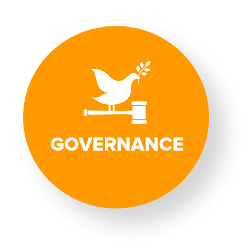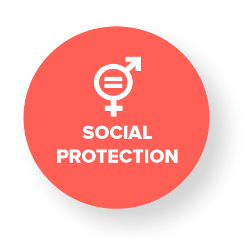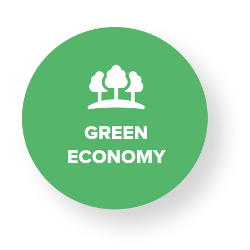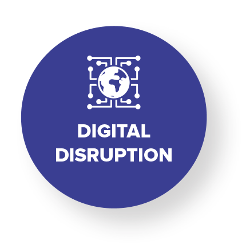Beyond Recovery: Towards 2030
Beyond Recovery: Towards 2030
Our Evolving Response
With up to 100 million more people being pushed into extreme poverty in 2020, governments and societies face unprecedented policy, regulatory and fiscal choices as they act to save lives and set a course for a sustainable future. The choices made today, if made well, could be the tipping points that transform our societies and our planet for the better.
The next phase of UNDP’s COVID-19 crisis response is designed to help decision-makers look beyond recovery, towards 2030, making choices and managing complexity and uncertainty in four main areas: governance and agency, social protection, green economy, and digital disruption. It encompasses our role in technically leading the UN’s socioeconomic response.
A forward-looking response to COVID-19 could end an era where one third of all food produced is wasted while 1 in 10 people goes hungry, where 10 times more is spent on fossil fuel subsidies than on renewable energy, and where more than two billion people live in fragility, conflict or violence. It could transform the lives of those who were out of school, out of work, offline and off the grid, even before the virus spread.
UNDP has identified seven such tipping points, ranging from the renewed pursuit of peace encapsulated in the UN Secretary General’s call for a global ceasefire, to decisive moves to tackle exclusion, racism and gender inequalities. Taken together, they offer a pathway beyond recovery, towards 2030 - to turn the greatest reversal of human development into an historic leap forward, with the Sustainable Development Goals as our compass.
UNDP's Offer 2.0

This area of work is more important than ever as governments come under pressure to navigate crisis and uncertainty, deliver digitalized services, enable access to information and social protection, and function in transparent, accountable and effective ways. Governments and civil society will need to work together to advance social cohesion and gender equality while upholding human rights and the rule of law, especially in fragile and conflict-affected contexts where jus- tice and security concerns may be more acute.
UNDP will support our partners in making choices that build social capital, deliver inclusive services, and open civic space to lay the foundations for the future -- a new social contract fully reflective of people’s agency that builds trust in institutions and closes the gap between people and the state.

Social protection, including cash transfers, universal health coverage and access to other basic services, will be central to uprooting the inequalities that permeated societies before COVID-19, and that are starkly visible today. The drive for gender equality is leading a wave of change that must be supported to address the discrimination and bias that emanate from entrenched social norms, including around re-distribution of unpaid care work, leadership, and the digital sphere.
For governments to invest in these areas, they need fiscal space. UNDP echoes the call of the Secretary-General for a debt standstill for all vulnerable countries and will support countries to leverage this fiscal capacity effectively. Public-private solidarity and partnerships will be critical to build resilient social protection systems that can weather shocks, create strategies for informal sector workers, and design a new generation of resilient, green jobs that support youth-led entrepreneurship.

This is the moment to restore balance between people and planet, designing and de-risking nature-based solutions as part of a new social safety net for the world, encouraging sustainable public-private partnerships such as in ecotourism and green transport systems, transforming agriculture from a carbon contributor to a carbon sink, and ensuring integrated thinking and action with the health sector to tackle air pollution that kills seven million people each year.
On climate change and energy systems, new IRENA research sets out that the value of decarbonizing the global economy by 2050 would be eight times the cost, taking health and education benefits into account. Cumulative global GDP would grow by USD 98 trillion above business-as-usual between now and 2050 and renewable energy jobs would quadruple to 42 million.
Today, therefore, as governments determine how to invest tax-payers’ money, they have a choice to make: stimulate fossil fuel industries and other remnants of the way things were—short-term band-aids that will reinforce the collision course with nature—or invest in an inclusive green economy.

With schools closed and stark divides in access to online learning, UNDP’s Human Development Report Office estimates that 86 percent of children in primary education are now effectively out-of-school in countries with low human development - compared to just 20 percent in countries with very high human development. This is the largest reversal in education on record, taking us back to the 1980s—a time before the Sustainable Development Goals or the Millennium Development Goals.
Closing the internet access gap would halve the human development regression by getting children back to education – albeit remotely. As our partners in UNICEF, UNESCO, ILO, ITU, WHO, UNCDF and beyond know, this is just an illustration of what investing in digitalization could achieve right now. The surge in tele-schooling, tele-work- ing, tele-medicine, and digital payments during the COVID-19 crisis are just the tip of the iceberg in digital transformation. For many programme partners, e-governance support is a prerequisite to respond at speed and at scale.

 Locations
Locations